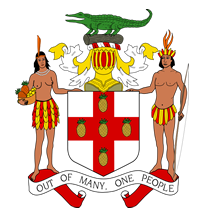The island - discovered by Christopher COLUMBUS in 1494 - was settled by the Spanish early in the 16th century. The native Taino, who had inhabited Jamaica for centuries, were gradually exterminated and replaced by African slaves. England seized the island in 1655 and established a plantation economy based on sugar, cocoa, and coffee. The abolition of slavery in 1834 freed a quarter million slaves, many of whom became small farmers. Jamaica gradually increased its independence from Britain. In 1958 it joined other British Caribbean colonies in forming the Federation of the West Indies. Jamaica gained full independence when it withdrew from the Federation in 1962. Deteriorating economic conditions during the 1970s led to recurrent violence as rival gangs affiliated with the major political parties evolved into powerful organized crime networks involved in international drug smuggling and money laundering. Violent crime, drug trafficking, and poverty pose significant challenges to the government today. Nonetheless, many rural and resort areas remain relatively safe and contribute substantially to the economy.
Jamaica is a parliamentary democracy under a constitutional monarchy and part of the Commonwealth realm.
Members:
Resources
Displaying 46 - 50 of 77Land Development Duty Regulations.
These Regulations implement provisions of the Land Development Duty Act relating to, among other things: notification of an agreement to sell land; assessment of duty and notice of assessment; (assessment of) betterment charge; and resolution of disputes regarding assessment.
Implements: Land Development Duty Act. (2001)
Land Development and Utilization Regulations.
These Regulations implement provisions of the Land Development and Utilization Act and concern, among other things: registration on the register as mentioned in section 2 of the Act; appeal against an Order made under subsection (1) of section 5 of the Act; information to be provided to the Minister on any sale of agricultural land or to any grant, assignment or surrender of a tenancy of such land for an interest not less than that of a tenancy for a year; and representations to the Land Development and Utilization Commission.
Law Reform (Landlords and Tenants) Act.
This Act concerns the relationship between a landlord and a tenant and especially the termination of rent. The Act prohibits distress for rent and allows a tenant to remain on cultivated land for a certain period after a notice to quit.
Mortgage Insurance Act.
This Act grants power to the Jamaica Mortgage Bank to effect contracts of insurance for loans insurable under this Act. Loans include loans for the purchase of agricultural land and loans secured by a first mortgage on agricultural land or not exceeding twenty-five years in term. The Act also provides for criteria and procedures for the execution of the insurance. The Bank shall establish a Mortgage Insurance Fund for purposes of this Act.
Implemented by: Mortgage Insurance Regulations. (1986)
Amended by: Mortgage Insurance (Amendment) Act (No. 19 of 2014). (2014-12-23)
Mortgage Insurance Regulations.
These Regulations implement provisions of the Mortgage Insurance Act in respect of a wide variety of matters including application for an approved loan, criteria for approval of a loan, the relationship between the approved lender and the Jamaica Mortgage Bank, insurance of an approved loan and conditions of insurance.
Implements: Mortgage Insurance Act. (2011)


